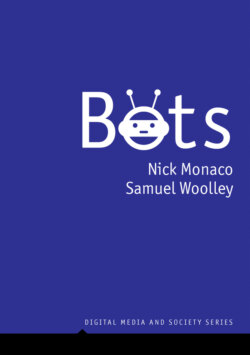Читать книгу Bots - Nick Monaco - Страница 8
Where Does the Word ‘‘Bot’’ Come From?
Оглавление“Bot” is a shortened version of the word “robot.” While the concept of a self-managing machine that performs tasks has arguably been around for hundreds of years (for example, DaVinci’s 1479 mechanical knight), the word “robot” was not coined until 1920. It was originated by Czech playwright and activist Karel Capek in a play called “Rossum’s Universal Robots” (“RUR”). In the play, the titular robots are humanlike machine workers who lack a soul, which are produced and sold by the R.U.R. company in order to increase the speed and profitability of manufacturing. Capek called these machines roboti at the suggestion of his brother Josef, who adapted the term from the Czech words robotnik (“forced worker”) and robota (“forced labor, compulsory service”) (Flatow, 2011; Online Etymology Dictionary, n.d.). Robota has cognates in other modern European languages, such as the German Arbeit (“work”). Inherent in these roots is the idea of forced servitude, even slavery – a robot is an object that carries out tasks specified by humans. This idea is key to the understanding of bots in the online sphere today, where bots are computer programs that carry out a set of instructions defined, ultimately, by a human. There is always a human designer behind a bot.
While “bot” began as a shortened form of “robot,” in the era of the modern internet, the connotations of the two terms have diverged. Bot is now used mostly to designate software programs, most of which run online and have only a digital presence, while robots are commonly conceived of as possessing a physical presence in the form of hardware – of having some form of physical embodiment. Wired journalist Andrew Leonard writes that bots are “a software version of a mechanical robot” whose “physical manifestation is no more than the flicker of electric current through a silicon computer chip” (Leonard, 1997, pp. 7–24). Today, social bots’ implementation may involve a visual presence, such as a profile on Twitter or Facebook, but the core of their functioning lies in the human-designed code that dictates their behavior.
